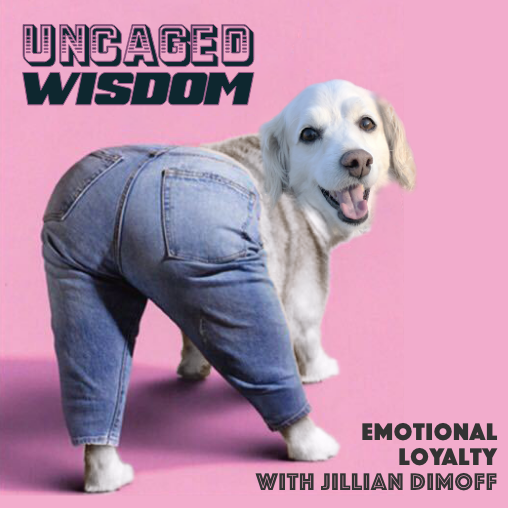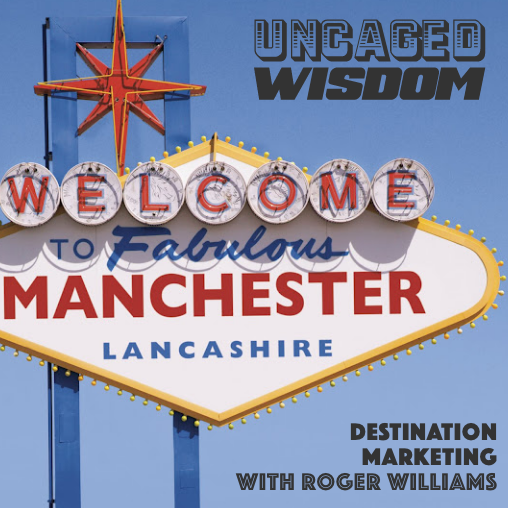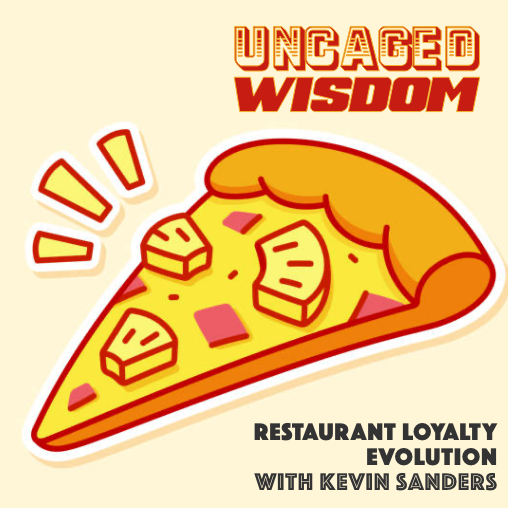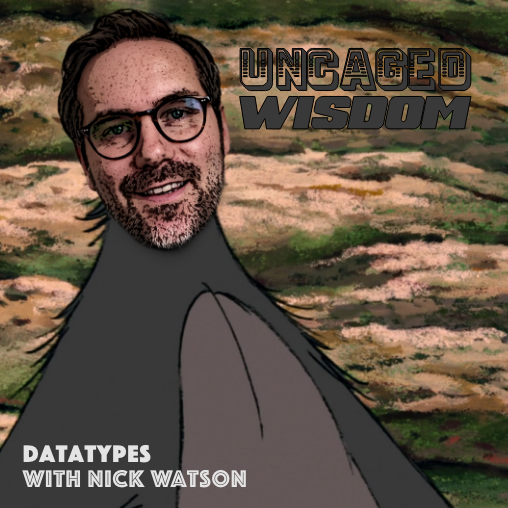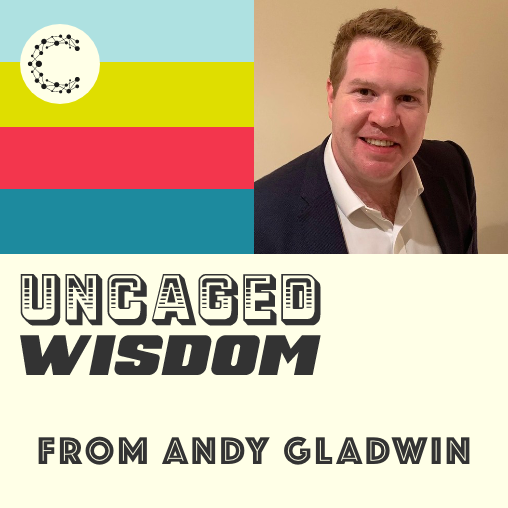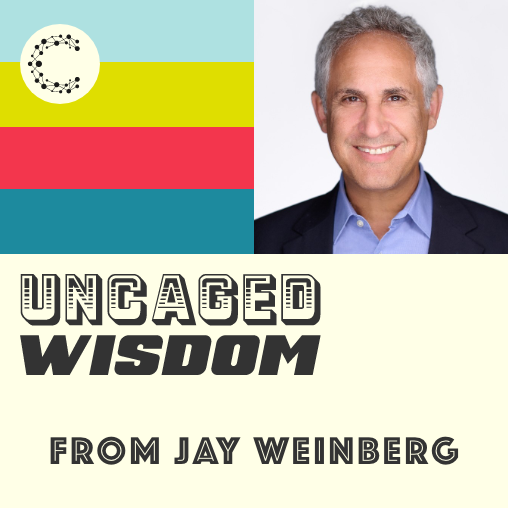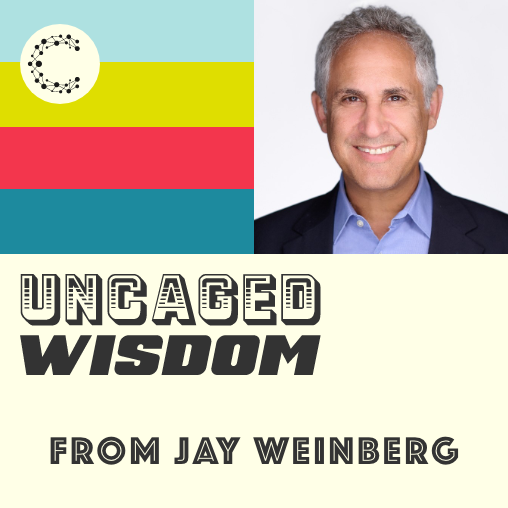Deep Dips: Emotional Loyalty w/ Jillian Dimoff
- 0.5
- 1
- 1.25
- 1.5
- 1.75
- 2
Jillian: Do you guys just go to me automatically because you know that I'll do it and I have nothing else to do?
Julian: You are a wonderful lighthearted, funny guest to have on these things who would lighten any room, Jillian. But yes, I know that your schedule's very empty.
Speaker 3: Uncaged Wisdom. Cheetah Digital's podcast for modern marketing.
Julian: We've entitled this deep dip because we have depth, Jillian, but we're just dipping the toe in really. I've got to work on that. Just the tip of the iceberg.
Jillian: Tip of the iceberg.
Julian: That's our hashtag for this.
Speaker 4: I don't even know what that means.
Speaker 5: No one knows what it means, but it's provocative.
Speaker 4: No, it's not. It's gross.
Speaker 5: It gets the people going.
Julian: We're going to go straight into our brand new number one feature, which I've entitled sympathy for the devil's advocate.( singing)
Speaker 6: The worst advice is advice.
Julian: We are here today gathered to talk about, what are we talking about? Oh yeah, emotional loyalty. Good. I just had to check the notes. But let's start off with something a little bit inflammatory. Jillian, is brand loyalty dead?
Jillian: No.
Julian: Do customers have any loyalty to brands anymore?
Jillian: Well I don't think that brand loyalty is dead, but I do think it depends on the industry. So like gas I'll go anywhere. I don't even care if it's watered down, it doesn't matter as long as it's cheap. And that's all I want to talk about because I'm old and I'm like an 80- year- old man in a 4- year- old body. I want to talk about gas prices and the weather. But then there's also brands like Starbucks, like are you going to go and get gas station coffee? Or are you going to go get a Starbucks? Probably Starbucks, right? And probably because shameful plug for loyalty probably because you have the loyalty app and you know that you're going to get to earn more plays or you're going to maybe earn a free coffee. And so I do think that there's industries that are still holding really strong in terms of brand loyalty, specifically retail as well. So depending on what kinds of benefits or if they make you feel good when you're there or the overall experience is additive to your lifestyle like Patagonia, if they're aligned with their values. I saw that Patagonia was closing their stores around the holidays to give their employees time off, or that they're really focused on sustainability. And so I think that things like that will continue to forge that relationship with their customers.
Diva: If it's based just on price, if brands are basing it just on price, people are not going to be loyal because they're going to go through whatever's the cheapest like gas. But I think brands can still show that they have the right values and speak to you in the right way and build that relationship, even if it is gas or its financial services. Maybe they're supporting Movember, I've seen some financial services brands doing that. And I'm still speaking to you in that way. Also if it's just a standalone piece and people aren't speaking to you in the same way, then I think that would also, for me, make me not as loyal because I'm like," Well you have just a one- off program, but you're not consistently speaking to me." All industries can create that loyalty, but you're not seeing that at the moment.
Julian: All right Jillian, you've managed to convince us that loyalty is not dead.
Diva: Jillian, tell us your take on what defines emotional loyalty, and what are the tactics or things that need to put in place and to drive that?
Jillian: I guess I would say that emotional loyalty is a more sophisticated, modern approach to loyalty that goes away from the transactional and actually leans more towards experiential and building one- to- one relationships with members. You can say customers, but hopefully we're talking about members. And giving them something, an experience, soft benefits tiers so that they can aspire to engage with the brand at a deeper level but at a reciprocal relationship. And so I'm more willing to give up my data if you're going to give me more than a point per dollar. So there's a lot of brands that are still just not quite there. And we've been talking to retailers even recently that are still using these very transactional programs, but I think that they see what other brands are doing like Starbucks and Sephora. And there's a lot of brands that are the best in class, I guess I would say, that other brands want to emulate. And so where you would have thought that Sephora's model wouldn't be applied to other industries, now we see other brands that are like restaurants that are giving customers choice and that are using that data in a smart way. Like for instance I have a dog, hopefully where I shop isn't going to send me promotions or offers for cats, right? But they did. They did, even like eight years ago. So I think that brands are using data in a lot smarter way. And so that's how I would define who would be doing the best approach to emotional loyalty or embracing emotional loyalty.
Julian: Do people see that transactional programs it's easy for people to move to another transactional program in the same space? Was that one of the eureka moments for brands or was it actually they just wanted to try something different to make themselves different in the space? And suddenly they realized that building these emotional connections is more powerful.
Jillian: Yeah. Because I think a lot of these brands can almost be interchangeable, right? So I can still buy potentially the same labels at another company. So also, how do retailers compete with the likes of Amazon? Because I don't have to leave house. I can find something and if I don't like it I just take it right back and potentially it could be cheaper than me going in the store. Sometimes it feels like the better deals are the online deals. And so if you know how to play the abandoned cart game, and I'm guilty of it, I'll put something in my cart and then wait for them to send me my offer, but nobody's going to do that for me in a store. If I put it on the counter and I walk away they're like," Hey, would you like to buy that for 10%?" I'm like,"All right." And then I come back to the counter, right?
Julian: The abandoned cart game, the Supermarket Sweep they never made it to air.
Speaker 8: Yes, there's prizes in store and much, much more when you play Supermarket Sweep.
Diva: So that comes back to the values, right? Like do you have that relationship with the brand versus a third party say? And I think it's that shift to a longer term approach of it being a one- to- one relationship. And I always like to think about not just seeing. Thinking about a brand as a relationship like it is with a person and what do you want from them? You want them to share your values, you want them to be open to feedback and speaking to you the same way. Like if I was having a text message from someone that was really happy and then an email that was completely corporate tone of voice, right? That would be weird. That'd be really jarring if Julian did that to me and it's the same with a brand, right? You want that Instagram to be the same as what they're saying in emails, otherwise it's just like it does not consistent experience.
Jillian: There is that, I think, opportunity for brands to create something that's a much stronger relationship than going through a third party or another channel, like an Amazon or what have you.
Diva: The other thing I think about with a relationship or a friendship is are their family and friends saying good things about them? And that's like the employee advocacy in store and online I think is also important with a brand.
Jillian: And I think also just making it simple. Some brands they just have many different variations of a program. There's also different things that you have to take into account when designing a program so that it's simple and it's straightforward and you're not letting that noise from all of the other things that you have going on confuse your customers or to potentially cannibalize other aspects of it. So we've talked to customers even recently who have pop- ups and things on their website that say," Hey, you want this offer? Sign up for email and you get 15 or 20% off." But then you're already on the loyalty website and it's only offering you 10. So we're diluting what the real value is, and the real value is the loyalty program. I mean the emails stuff is a lot of times just a one and done, right? If you sign up for email and SMS, we'll give you this one- time chance to get a promotion. Because I have tried to go back to the, well I'm not going to lie, down the road where I'm like," Oh, I wonder if this will work again if I can just...? I unsubscribe, now what if I resubscribe, can I get that offer again?" And smart companies will say no to me so good for them, but there's other companies that I think that they just look for a flag. Is this person subscribed or not? And not looking at historical behaviors, it's important to level set and take a look at everything holistically, instead of just like I'm only going to look at email or I'm only going to look at loyalty.
Diva: Buying across the business, right?
Jillian: Exactly. Yeah. So it should be an enterprise approach, right? And same with how everything jives together. Big theme or issue, I guess, we've been seeing is data efficiency and how do we get data from a point of sale and also maybe another ESP and marry everything together and make it so that the customer still feels like it's seamless. Especially some brands, I think this is really true in retail, a lot of their point of sale systems are old and they have limited functionality. And how can we make this the best possible scenario? And maybe we take all of that data and put it into a CDP so that all of that data is actionable that we're getting it and it doesn't feel like there's a disconnect with the point of sale.
Julian: We started off talking about some good examples of emotional loyalty, but you mentioned the one- to- one experience between a brand and a customer. What kind of experiences could be offered?
Jillian: So it could be a variety of things. It could just be making my shopping experience that much better. So maybe you're making product recommendations that are actually something that I would be interested in, or it could be personalized offers so that I am like," Oh, you know what that is? A great offer for me." Sometimes I log into the Target app and I feel like it's a little overwhelming. All I shop for is my kids and my dog and I, right? But when you log in-
Julian: There should be a song about that, my kids, my dog, and I.
Jillian: ...De La Soul. Yeah.
Julian: I'll make into the cup. Don't worry.( singing)
Jillian: So I feel like there's things like that where you're are like, I don't know, it can be almost cumbersome. Same with, I don't know if you guys ever use any of the programs for the grocery stores, I feel like those are still kind of lacking. My grocery store that I go to has a coupon clipping sort of thing, but it's like a bazillion skews in there. And so you have to search and hunt and pack for something that you're actually going to buy. So I think those kinds of things where you're actually giving someone a personalized experience in terms of offers and the product that they are interested in buying. But then the other side of that is, maybe give me a sneak preview or limited time access to a higher tier so I could say," Hey, you know what? I do want to be at that level. And I am willing to maybe give you share of wallet where maybe I was purchasing something somewhere else, because I see the benefit and I'm going to spend more with your brand so that I can also reach that tier level." And then the other things like experiential sweepstakes, or if the soft benefits like exclusive access or VIP member events, things of that nature. But then also catalogs that are a lot richer than coupons. Because I think that we all have credit cards and I'm big Southwest nerd. Like I will fly out of my way and go on the Southwest flight because they make it so much easier for me to earn. And so I can earn at restaurants that I use my credit card at even little mom- and- pop stores. I get an email that says," Hey, you earned these points." And then I think the other great thing that is also a soft benefit but has a monetary value is a lot of the brands that recognize the challenges that COVID has brought over the last couple years. So I just got an email recently that Southwest was extending my A- list status because even though I have purchased a lot and I earned the Companion Pass, it's like 125, 000 points by the way. I didn't get my A- list status because I have hardly even gone anywhere because all of my meeting are on Zoom.
Diva: Jillian, we'd love to know how you typically would might kick off this conversation with the brands and the journey you go on to establish an emotional loyalty program.
Jillian: So I feel that a lot of times, maybe because I've been in or I've done strategic consulting work, I always feel like it's really important for me to do my research before I meet with a client. And I might go not only to sign up for the program, but I might actually go and talk to store associates and get their opinion of the experience. Or I sign up and I see, what are the actual benefits? Or how long did it take me to even get it acknowledged that I signed up for this program? Or with restaurants there's a provider that basically has a shared platform for every single restaurant that's on there. So when you go to sign up for Bob's Chicken, it'll be like," Hey, you're already a member." And I'm like," What? Bob's Chicken is in California how could I be a member?" And then it's because it's a shared platform because even though I live in Chicago it thinks that you're already in the system because you are in the system, but. So I do my research and then we talk about what their challenges are. Like," What are you trying to do? And when do you want to actually do this? Are you trying to actually launch something before back to school next year? Because we need to hop on it and start talking about what a program design is going to look like and what systems are you using and what's the challenges?" And some of them are already in the midst of conversions on their other tech stack and that needs to be taken into consideration. But then I think a lot of times, and maybe what we miss sometimes on the technology side is that, these programs are a part of this client's legacy, right? So if they're going to run a program they want it to represent who they are and they want it to be a really good strong program where they can go to a conference and get recognized for being innovative and for making a difference in the industry as a whole. So when they move to another brand they can say," Hey, I built that program and that's something I'm really proud of." And that goes on their resume. And so we have a really strong impact on these people's careers too. And no wonder that they are so selective, right? And they should be doing their due diligence on the vendors that they're talking to because it can really make or break them.
Jennifer: There's one point I want to touch on. What really inspired me for emotional loyalty is Ian inaudible. But he keeps talking about how at The North Face and at Vans, they don't just sell shoes, they sell shoes, but they don't just sell shoes, they don't just sell backpacks, they sell these things so that their audience can live a lifestyle. They're at the skate park they're like, " We're not just selling shoes we're selling that kid away to fit in with his friends. In a way to play in a hobby he loves." So what he specifically said was," When we started the journey towards creating loyalty, we looked at what our customers need. And what our customers need is not a new jacket every six months or new shoes every three months, what our customers need are products that help them explore the world, express their creativity, and really do what they love doing."
Jillian: And it's what I mean when I'm saying like a brand is additive to your lifestyle, right? Lululemon clothes look great on you, right? But also that's what everybody wears. You feel stylish. And I think that maybe it makes you feel good about yourself. And so when you feel good about yourself you're more likely go exercise. And so that's like a cyclical effect, right? Because you feel good about yourself and you're like," Hey, I look nice. I'm going to go to the gym." And then you come out and so you're physically and mentally well, right? And then even Vans is additive to your life lifestyle. And you're thinking about the brand even when you're not there. Because you believe in the causes that they're in or you enjoy in the program, sort of that emotional aspect. Like the first campaign we ever did was tell us about your first pair of Vans. And so all the responses were highly emotional. I'm sure that there was an intention to elicit an emotional response, but I think that the quality that they get and how deep people were willing to go even publicly on social media about how it made them feel like they're part of American culture. My sister was a really great basketball player and she said years older than I am, and so I wanted to be like her. And when I was in grade school I wore the same number that she wore and I did my hair. I grew my bangs out even in fourth grade because I have older sisters, and shopped at like the kids' Gap because I wanted to be like her. And I remember she bought me my first pair of Jordans, I was in fourth grade. Tiny with the little netting on them. This is in the'90s by the way. And I have a picture of me and I'm like this. Like so excited at Christmas because I felt like they were going to make me play better so that I would be like her, but it also just makes you feel like you're part of something bigger.
Julian: Jillian, thank you as always for illuminating our opinions on emotional loyalty.
Jillian: Great.
Julian: To close out, we used to do Uncaged Wisdom, but some of our guests didn't have any and that was a real sad state of affairs. But Diva has got a brand new feature.
Diva: Jillian, we are going to try out our first ask you anything, a spin on a popular idea. So it gives us a canvas to really ask whatever we want. So-
Julian: Anything you could say.
Diva: ...Anything. Literally anything. So ask you anything. The question that we pose to you today is how would a dog wear a pair of trousers?
Jillian: Okay. So Millie is very talented and sometimes she stands on her hind legs and she can walk like that sometimes. So I would say that she is definitely jeans over the back two legs. But also I don't know if you've seen Millie, but she's quite a gorgeous little lady. And so I feel like she is low- rise like Britney Spears' Slave-
Diva: Britney?
Jillian: ...For you.
Diva: Oh, yeah.
Jillian: With the snake and the whole thing, she's rocking those kinds of pants.
Julian: What a saucy little dog you've got.
Jillian: She's like," It's Millie, bitch."
Diva: What an image.
Julian: Three things I took out from emotional loyalty is the power of personalization of making sure that you are offering things that are relevant to someone. The soft benefits of thinking through beyond just discounts and transactions, what the soft benefits that actually means something to someone who's using that particular service or product. And the other one that I think is brilliant and often overlooked, but use your assets. If you're a brand and you're a creative brand or you're a brand of history or your some that has a lot of tenure, you have so much stuff. And that's not even including all the creative, things that you can serve up into... If someone who's part of an emotional loyalty program before just the average Joes and Janes, and other names available. Thank you Jillian for talking to us about emotional loyalty today.
Jillian: All right. Good luck editing.
Julian: Thank you Diva for being here today and thank you Millie.
Diva: Thanks Millie. inaudible.
Jillian: Thank you for letting me participate you guys. I really appreciate it. Thank you for having me.(singing)
DESCRIPTION
On this week's Uncaged Wisdom, we are opening the New Year with Jillian Dimoff to discuss Emotional Loyalty. Jillian is a Strategic Account Executive here at Cheetah Digital, and today, she joins Diva and Julian for a conversation to help modernize your loyalty program. This discussion brings insight into the power of personalization and why you need to make sure you use your creative assets. Listen now!
Today's Guests


